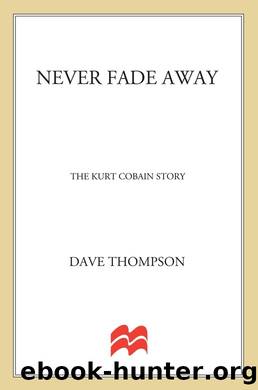Never Fade Away by Dave Thompson

Author:Dave Thompson
Language: eng
Format: epub
Publisher: St. Martin's Press
Published: 2011-10-12T16:00:00+00:00
The memorial on Sunday was sponsored by three local radio stations. (Photo by Curt Doughty)
On Saturday night in Cobain’s original hometown, Aberdeen, Washington, about 300 fans held a candlelight vigil at a waterfront park to remember the city’s most famous native. (AP/Wide World Photos)
Now here were Nirvana being offered four times that much simply for signing with one label! And if they split up when they’d cash the checks, Kurt mused, who’d be able to stop them? Oh, the lawyers could wrangle and wring their hands in despair, but at the end of the day … . it was a tempting idea.
But so was that of seeing just how far Nirvana could go under their own steam, and though the deal they eventually signed, with Geffen, was less than those they’d been offered elsewhere—$287,000, compared to the cool million which Capitol Records apparently dangled—at the end of the day, Nirvana still came out on top.
“We have one of the best contracts any band has ever had,” Kurt boasted. “We have complete control over what we do [a legacy of Sonic Youth’s own demands when they signed to Geffen], and what we release, which literally means that if we handed in a 60 minute tape of us defecating, [Geffen] would have to release and promote it.”
For now, however, he would be content simply to get Nevermind out of the way. Resisting Geffen’s attempts to pair the band with a “big name” producer—R.E.M.’s Scott Litt and Neil Young’s David Briggs were both mooted by the label—Nirvana would continue to work with Butch Vig, even though he had never produced a major label album before. Neither, Nirvana responded, had they.
Work on the record, which would include rere-cordings of several of the songs intended for the second Sub Pop album, got under way in May, 1991, in Van Nuys, CA. The budget, $650,000, was almost precisely one thousand times larger than Sub Pop had given them for their first record, and while that had only been a single … what was an album anyway, if not half a dozen singles?
When Kurt thought in those terms, however, he wasn’t thinking purely in terms of music and money. Like so many other people who grew up during the 1970s, who watched, even from afar, the starburst of Punk at the end of the decade, the single was still the medium which most suited rock’n’roll, a one-off roar which captured an essence; the sound of a band, but its message, its very zeitgeist.
The Pistols’ Never Mind the Bollocks was a great album, but it never recaptured the magic of “Anarchy in the UK”. The Clash made a killer debut, but “White Riot” said as much in three minutes as The Clash said in more than thirty. That had even been the thinking, too, behind the Sub Pop singles club—new bands, new sounds, and none of them took more than four minutes to listen to. As Kurt joined Vig and the band in sorting through the songs which would make the album, that was the idea at the back of his mind.
Download
This site does not store any files on its server. We only index and link to content provided by other sites. Please contact the content providers to delete copyright contents if any and email us, we'll remove relevant links or contents immediately.
| Classical | Country & Folk |
| Heavy Metal | Jazz |
| Pop | Punk |
| Rap & Hip-Hop | Rhythm & Blues |
| Rock |
Cecilia; Or, Memoirs of an Heiress — Volume 3 by Fanny Burney(30934)
Cecilia; Or, Memoirs of an Heiress — Volume 2 by Fanny Burney(30889)
Fanny Burney by Claire Harman(25784)
We're Going to Need More Wine by Gabrielle Union(18074)
Plagued by Fire by Paul Hendrickson(16637)
Cat's cradle by Kurt Vonnegut(13868)
Bombshells: Glamour Girls of a Lifetime by Sullivan Steve(13109)
All the Missing Girls by Megan Miranda(12752)
Leonardo da Vinci by Walter Isaacson(11903)
4 3 2 1: A Novel by Paul Auster(11052)
Adultolescence by Gabbie Hanna(8145)
The remains of the day by Kazuo Ishiguro(7551)
Note to Self by Connor Franta(7024)
Diary of a Player by Brad Paisley(6866)
Giovanni's Room by James Baldwin(5879)
What Does This Button Do? by Bruce Dickinson(5527)
Recovery by Russell Brand(4566)
Born a Crime by Trevor Noah(4511)
The Kite Runner by Khaled Hosseini(4437)
